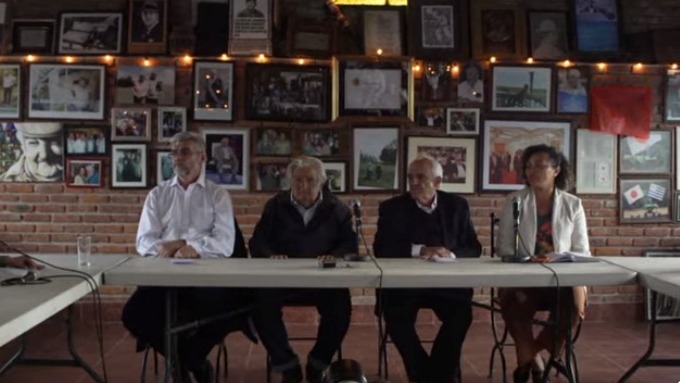It will be convened by Pepe Mujica from Uruguay and will be joined by social, trade union, political and human rights movements from all over the continent. It will take place from 7 to 9 December in the Brazilian city.
By Mariano David Vázquez for CTA Autónoma
This Tuesday, the former president of Uruguay, Pepe Mujica, together with representatives of social movements, political parties and trade unions, launched the Latin American and Caribbean Day of Peoples’ Integration. The Day will be held from 7 to 9 December in Foz de Iguazú, on the Triple Border of Brazil, Argentina and Paraguay.
Rafael Freire, General Secretary of the Trade Union Confederation of the Americas (TUCA), was the first to speak: “We defend Latin America as a territory of peace. This day that we are launching today is the product of a historical process, it does not start now: it has its origins in the world social forums, the struggles of peasants and native peoples, feminists, Afro-descendants, diversities, workers”.
The sociologist added that “this is a challenge to work on unity and social articulation for regional integration between social movements and presidents, because integration without people is not integration. We have to work on concrete policies for integration. We have to work against the threat of neo-fascism, for democracy and equality.
Also present was Misi Leini, leader of the Brazilian Landless Movement, who called for “concrete proposals of what we want, with our leaders who are governing today, we have to build a common agenda of work. We have had important electoral victories such as that of President Lula. We want to call on all the activists of our organisations to meet at the end of the year in Foz do Iguaçu to dream of our integrated continent and the world we want.
Carol Proner, from Jurists for Democracy, added: “We fight for social, economic and environmental justice. We defend collectives against injustice and the will of the people. All of our commitment to the days”.
The conference, which promises to be multitudinous, will be held at the UNILA headquarters, which is why its rector, Diana Araujo, was also present: “We have 4630 students from all over the continent and from Africa, and we work daily on integration in this triple frontier. To have the opportunity to host this meeting is a great joy and an honour because I believe that this is what UNILA exists for, to hold these meetings to build regional sovereignty and peaceful coexistence.
Ernesto Samper, former President of Colombia, called for “continuing to defend democracy and one of the bases for this is equality. We need Truth, Justice, and Never Again, so I want to thank Pepe Mujica for his support for peace in our country. We are also here to talk about a word that was in disuse by the conservative governments of the region, which is the word integration. We want to raise our voice in protest against the new FTAA. For us, integration is not about circulating capital but about the collective purpose of building a region. We want integration with the people, not with the chancelleries but with the social movement of Latin America, which is what has made it possible for there to be no armed conflicts in the region. There are already nine countries that make up Unasur”.
And Pepe Mujica was in charge of the closing speech: “The idea is to get together with the social movements, the workers, the students to talk about these things. I want to draw attention: there is no triumph around the corner, this is a struggle for a cultural change that goes beyond our time because we have spent two centuries in the construction of our nationality”.
“This is a tool to defend ourselves in the world that is coming upon us. This is not about left or right, it is about being or not being, we don’t make history, we endure it. We have to realise that the only way to be able to influence decision-making is to have the capacity to go beyond our prejudices, it is about identity, about the construction of the future of our continent. Almost all the capitals have ports to remove it to the rich world. We have to share health, education, universities, and not have them go to Harvard, to the rich world,” Mujica exemplified.
Before concluding, the former president of Uruguay said: “It was more important to communicate with Paris and London than with each other and we have continued like that, now we realise that if we don’t get together, we don’t exist. Theoretically, we despise what we have, instead of improving it. There are plenty of natural resources. It’s not just to meet about Iguazú, it’s for social movements to work or fight for integration, it’s with the people or it doesn’t happen”.










